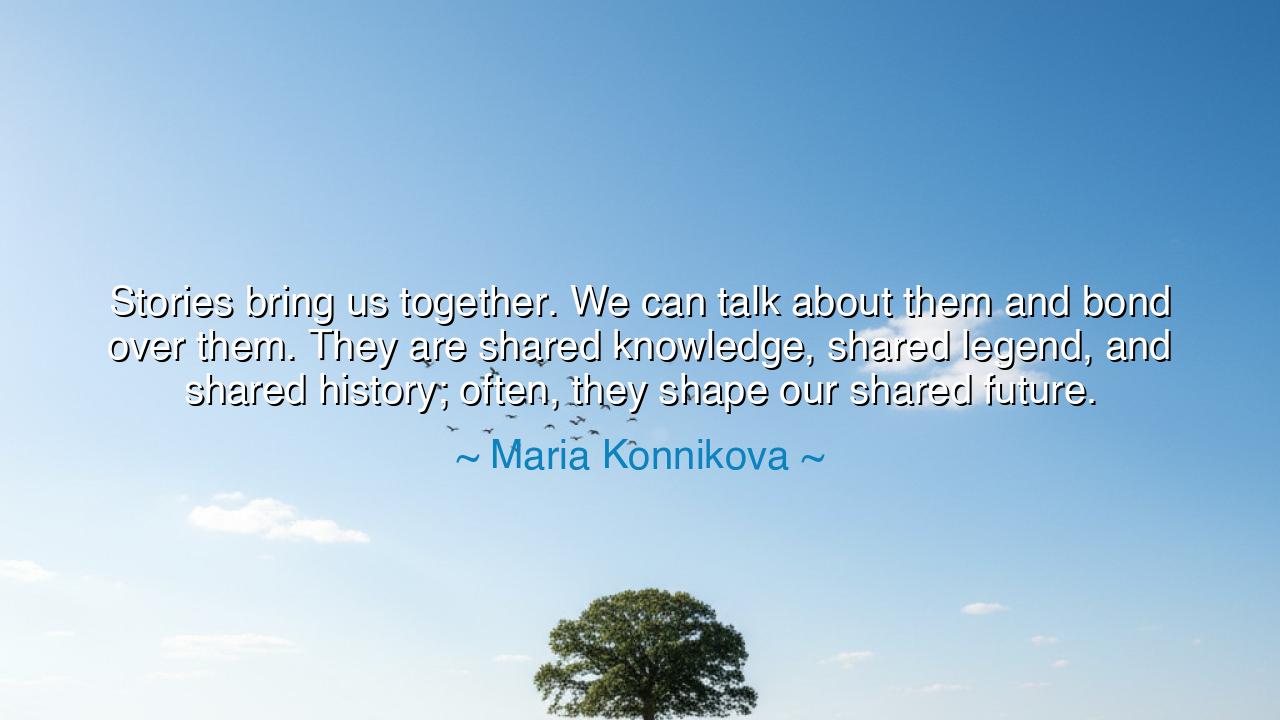
Stories bring us together. We can talk about them and bond over
Stories bring us together. We can talk about them and bond over them. They are shared knowledge, shared legend, and shared history; often, they shape our shared future.






The words of Maria Konnikova—“Stories bring us together. We can talk about them and bond over them. They are shared knowledge, shared legend, and shared history; often, they shape our shared future.”—are a hymn to the oldest treasure of humankind: the tale. Long before cities were raised, before laws were written or books bound, it was the story that carried wisdom from mouth to ear, from generation to generation. Her words remind us that stories are not idle entertainment, but the very thread that binds human souls together, weaving the fabric of community and destiny.
To say that stories bring us together is to name the sacred fire around which the first tribes gathered. In the dark of night, the hunter told of his chase, the elder recounted the deeds of ancestors, the mother soothed her child with tales of courage and love. Through these stories, fear was eased, courage was born, and the tribe became one. The story was not merely words—it was the hearth of memory, the glue of unity. Even today, though the fires are replaced by glowing screens, the essence is unchanged: stories remain the bridge between hearts.
Konnikova calls them shared knowledge, shared legend, and shared history. Knowledge gives us instruction—how to till the soil, how to heal the sick, how to navigate the sea. Legend gives us meaning—the hero’s journey, the warning of pride, the promise of hope. History gives us grounding—the record of where we came from, of victories and failures alike. All three, woven together, guide the soul not only in understanding the past but also in preparing for what lies ahead. A people without stories is like a tree without roots; it cannot stand long against the storm.
Consider the story of Homer’s Iliad and Odyssey. These epics, recited for centuries before they were written, did more than entertain the Greeks—they defined their values of honor, loyalty, cunning, and endurance. Soldiers and statesmen alike measured themselves by Achilles’ wrath and Odysseus’ cunning. These tales became more than shared legend; they became the blueprint for identity, the mirror in which a people saw themselves. So too in every culture—whether the Epic of Gilgamesh, the sagas of the Norse, or the parables of sacred texts—the story is both teacher and unifier.
Yet Konnikova’s wisdom stretches further: stories shape our shared future. For when we tell and retell, we do not only remember—we also imagine. The tales we choose to pass down plant seeds in the soil of tomorrow. A nation that celebrates conquest alone may breed war; a people who tell stories of compassion may foster peace. The stories we honor shape the dreams of our children, and those dreams become the deeds of our descendants. In this sense, to tell a story is to wield power over time itself.
The lesson, then, is profound: cherish your stories, but choose them wisely. Ask yourself—what tales do I share at my table, in my classroom, with my children, with my friends? Do they sow division, or do they bring unity? Do they glorify greed, or do they awaken generosity? Remember that every story is a seed, and from each seed grows a future. To be careless with stories is to be careless with destiny.
So, O listener, take these words to heart. Speak your stories often, but speak them with purpose. Learn the legends of your ancestors, and let them remind you of where you came from. Share the histories of those who suffered and overcame, so the sacrifices are not forgotten. And above all, create and share new stories of courage, kindness, and hope, for in them lies the future. For as Konnikova declares, stories are the bond, the legend, the history, and the future—they are the eternal flame of humanity, and it is our sacred duty to keep them burning.






AAdministratorAdministrator
Welcome, honored guests. Please leave a comment, we will respond soon